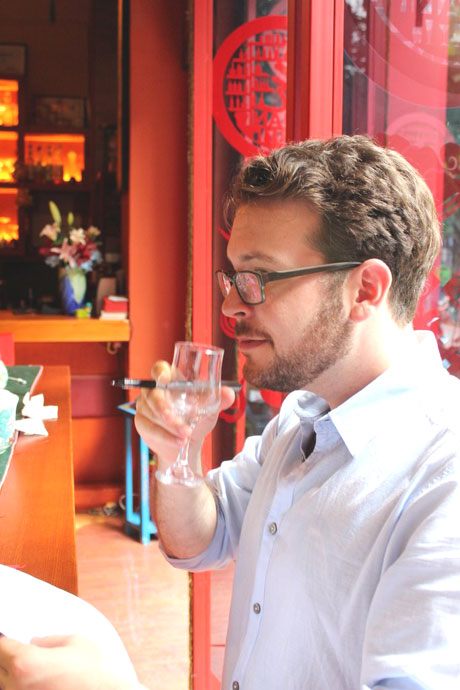300 shots and still standing
Updated: 2014-04-08 07:25
By Sun Ye (China Daily USA)
|
|||||||||
Ganbei! Salud! Cheers! However you drink, chances are China's infamous white liquor will leave you flat on your back after a few shots. Sun Ye chats to an unlikely baijiu aficionado and author, who discovered the more you drink, the better it gets.
If you think of baijiu, the typical Chinese spirit, as burning your throat, fouling your nostrils and offending your taste buds, read on, for your impression is a grave injustice to the country's national drink that should soon be dispelled.
At least, that is according to Derek Sandhaus from the United States, whose newly published book Baijiu: The Essential Guide to Chinese Spirits by Penguin China is written to turn baijiu critics into fans.
|
US author Derek Sandhaus spent three years to become a fan of baijiu after his first sip of the strong liquor. Provided to China Daily |
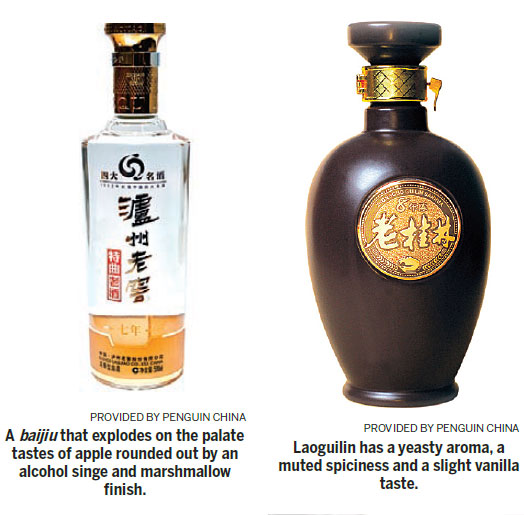
The 31-year-old spent three years trying to understand the hard liquor. He began his research as a baijiu novice, tasting it "just to see how horrible it is", but the more he drank the more curious he became.
Indeed, his first sip was unpleasant - "strong and gross" was his impression - so bad that he almost decided "never to drink it again".
"A lot of people expect it to be bad because it smells strange," he says.
Fortunately, he heard the theory that "after 300 shots of baijiu you'll appreciate it" and decided to put the saying to the test.
Starting as a skeptic, he kept a blog of his adventures with the alcohol. When the count reached 60 shots, the epiphany came. He had sampled the high-quality Luzhou Laojiao, sharp yet smooth, with a strong aroma and native to the Southwestern Sichuan province, China's biggest baijiu producing area.
"I don't think it was drinking a certain amount of baijiu that made me like it," he says. "But I've found one I feel connected to."
So he became a convert after drinking one-fifth of the proposed 300 shots, having tried fewer than 10 different kinds of baijiu.
He has since visited major baijiu regions around the country to study the spirit central to the Chinese way of life - white spirit production will reach 17.05 billion liters in 2016 according to Frost & Sullivan, a US-based market consultancy. Enough baijiu to fill the West Lake in Hangzhou, Zhejiang province.
"Anyone who lives in China for a long time knows baijiu is really important to China," Sandhaus says. "It's central to how Chinese celebrate holidays, central to the way people do business. It's really important in building and maintaining relationships in China."
During his journey that spanned the larger part of the country, from the northernmost Heilongjiang province to the Guangxi Zhuang autonomous region in the south, Sandhaus has come to see baijiu's deep-rooted cultural role.
"The best friends I made in China were people whom I went out drinking with," he says. "People really open up when they drink baijiu."
"It's not about getting drunk, it is about respect. It shows you value the other's relationship," he says. "I think alcohol is one of the most important parts of Chinese culture that people from other countries don't understand."
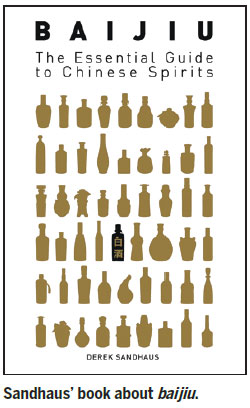
That respect also manifests itself in the various toasting rituals he experienced. In Henan province, for example, the toaster will not drink the toast but makes sure everyone else's cup is empty.
"Baijiu is made of grain. Food was precious back in the old times, and offering the best spirits to a guest definitely shows respect," says Guo Wulin, vice-president of the Chinese Liquor Culture Institute in Yibin, Sichuan province.
Guo agrees that baijiu is an essential part of Chinese culture and that an introduction from the Western perspective is needed.
"We say baijiu is the national drink because it's the presiding tradition for us," Guo says. "It has been inseparable with our thoughts and behavior for thousands of years."
He explains that baijiu is in line with the Taoist philosophy of being inclusive and complex in tastes and flavors, and it is best described "half-water-half-fire".
"It's too mysterious and far-fetched. That's why we need others' perspective in explaining baijiu," Guo says.
The reference book by Sandhaus aims to do just this. The scientific classification lists some 90 different baijiu, explaining their varieties - mostly depending on their smells - tastes, production processes, history and cultural meanings.
"The best case (after the book comes out) would be this: When you walk into a bar in five or 10 years in any city in the United States, you find some baijiu on the shelf," says Sandhaus, who returned to the US last September with his wife, who is a diplomat.
And with 600 (and counting) shots of baijiu under his belt, Sandhaus' blog, 300 Shots of Greatness, has taken a new turn - monthly recommendations and follow-ups on how baijiu will gain international ground.
Contact the writer at sunye@chinadaily.com.cn.
At a glance
Baijiu is a strong distilled spirit made most often from grains. It's generally 40 to 60 percent alcohol by volume. It's also the world's most popular liquor thanks to the Chinese population.
Tracing back to thousands of years ago, baijiu production is usually a five-step process that includes the preparation of ingredients, preparation of jiuqu (fungi as the main microbial starter), saccharification and fermentation, distillation and aging.
Baijiu mostly comes in five major varieties based on its smell. These are strong aroma, light aroma, sauce aroma, rice aroma and mixed aroma.
Tips from the author
1. Don't ever tell others you are a good drinker, because they inevitably want to put you to the test.
2. Pair local baijiu with local food. Pair salty, bland Beijing food with Erguotou and spicy stir-fried Sichuan cuisine with Shuijingfang.
3. There are no rules concerning how best to consume the drink, though you can smell it first for warming-up. Generally, just pour it, smell it and drink it.
4. There are other ways to make friends in China, but it's much faster and easier to drink baijiu with people.
(China Daily USA 04/08/2014 page10)
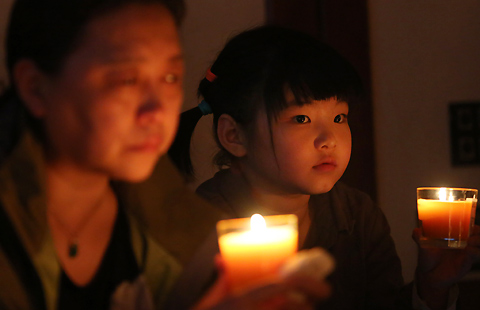
 Vigil marks one month since MH370 vanished
Vigil marks one month since MH370 vanished
 The world in photos: March 31-April 6
The world in photos: March 31-April 6
 Simply child's play
Simply child's play
 Photo special: Weird buildings in China
Photo special: Weird buildings in China
 Jackie Chan holds charity concert marking 60th birthday
Jackie Chan holds charity concert marking 60th birthday
 Microsoft to end support for Windows XP
Microsoft to end support for Windows XP
 Poor weather greets baby prince
Poor weather greets baby prince
 22 miners trapped in Yunnan coal mine flood
22 miners trapped in Yunnan coal mine flood
Most Viewed
Editor's Picks

|
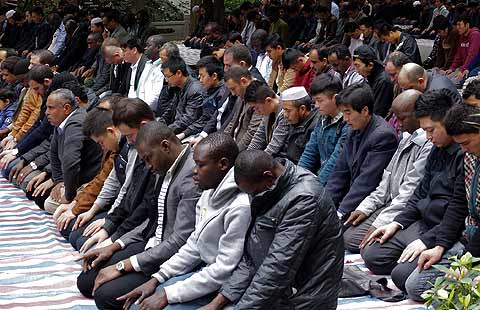
|

|

|

|

|
Today's Top News
Chinese, US defense chiefs begin talks
Time runs short in black box hunt
US warns China over yuan
Hagel's insensible remarks
Media: Japan, US differ in alliance expectations
Pro-Russians declare independence in Donetsk
China tours by Pentagon chiefs
Chinese military institutions visited by US officials
US Weekly

|

|
